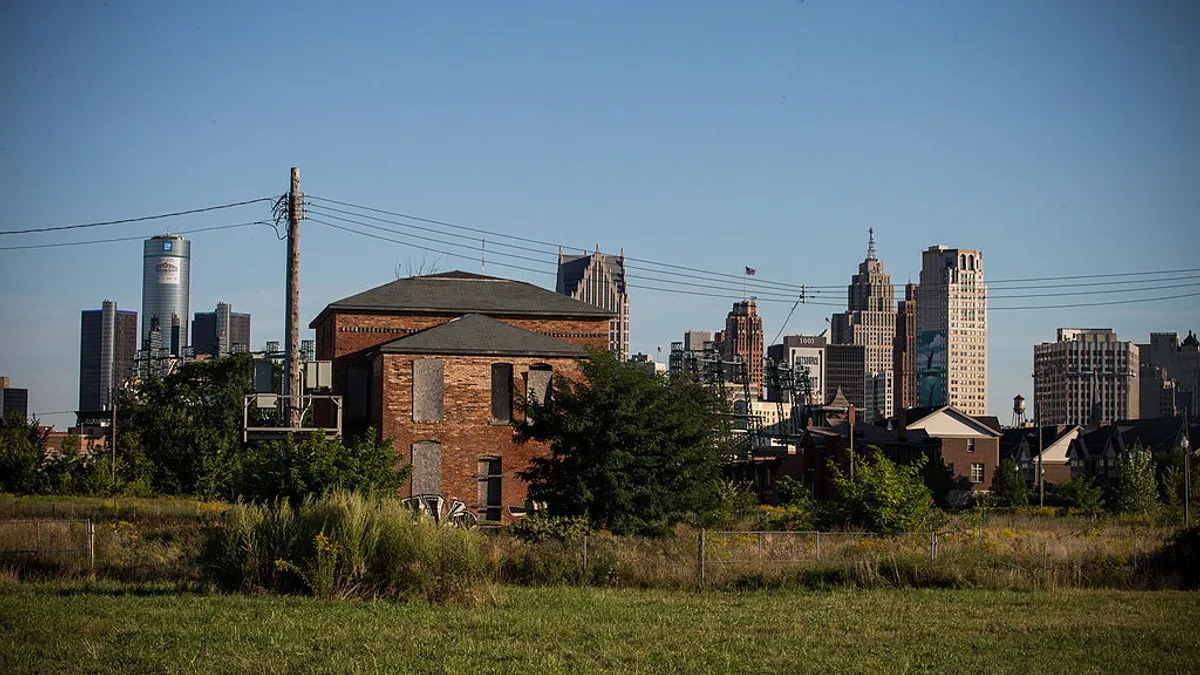Dive Brief:
-
Over 80% of U.S. metropolitan regions have become more segregated in recent decades, with the most segregated areas in Midwestern and mid-Atlantic states, according to a study of cities and regions published this week by the University of California at Berkeley’s Othering & Belonging Institute.
-
Researchers based the rankings on a "divergence index" in U.S. cities with populations over 200,000 from 1990 to 2019. The index "compares an area's racial demographics compared to the makeup of the larger region, which reveals the neighborhoods and cities where certain groups are isolated," the study states. The authors call it a "far more accurate" indicator of segregation than previous measures.
- Colorado Springs, Colorado, and Port St. Lucie, Florida, are the only localities out of the 112 cities ranked that the research considers "integrated." The 10 most segregated cities as of 2019 are Detroit; Hialeah, Florida; Newark, New Jersey; Chicago; Milwaukee; Cleveland; Miami; Birmingham, Alabama; New York City and St. Louis.
Dive Insight:
Of the 209 metro regions the researchers examined, 169 had become more segregated from 1990 to 2019 "despite policy efforts aimed at promoting integration," the study writes. Only 40 regions have become less segregated.
The increase in segregation correlates with "poorer life outcomes, particularly for people of color, in terms of health, educational attainment, economic mobility, and much more," the report states.
"These findings were as startling as they were disturbing," Stephen Menendian, the project's lead author and assistant director of the Othering & Belonging Institute, said in a statement.
Segregation is a structural problem, it's the "fabric of racial inequality," said report co-author Samir Gambhir, who manages the institute's Equity Metrics program. While the study isn't centered on the specific "causes or solutions" as to why some cities are not considered integrated, according to Gambhir, there are still immediate steps cities can take to address it. Local leaders should look at the "roots of the problem" to create policies that are proactive and intentional, he said.
The institute's findings also come as new research shows total U.S. life expectancy in 2020 declined by over a year, a decline attributed to the coronavirus pandemic. The reductions in life expectancy among Latino and Black people, who were disproportionately impacted by the effects of the coronavirus pandemic, were more than triple and double that of White people, respectively.
"The takeaway from these findings is that race itself appears not to be the determining factor in an individual's life outcomes. Rather, the more consequential factor for life outcomes is the environment in which that individual is immersed," the report reads.
Segregation has also had significant impacts on housing opportunities, with the effects of redlining from nearly 100 years ago still being felt in communities today. Some 83% of neighborhoods that were redlined or given poor ratings by a federal mortgage policy in the 1930s were considered "highly segregated communities of color" as of 2010, according to the report.
Household incomes and home values in White neighborhoods are almost twice as high as the incomes and home values in segregated communities of color. Highly segregated communities of color also have a 46% home ownership rate compared to a 77% home ownership rate in highly segregated White neighborhoods, the report finds.
Some cities — like Chicago suburb Evanston, Illinois — are turning to reparations to try and address the impacts of segregation and other forms of systemic racism in their communities. The city, considered the first in the U.S. to have such a program, plans to use an initial $400,000 from its Local Reparations Fund to award eligible residents up to $25,000 to pay for various housing costs, the Chicago Tribune reported in March.
More recently, 11 U.S. mayors from Los Angeles to Durham, North Carolina, announced the launch of a reparations pilot program ahead of the new Juneteenth federal holiday. The local leaders said they plan to pay reparations to some of their city’s Black residents, hoping to simultaneously "set an example for the federal government on how a nationwide program could work," NPR reports.












